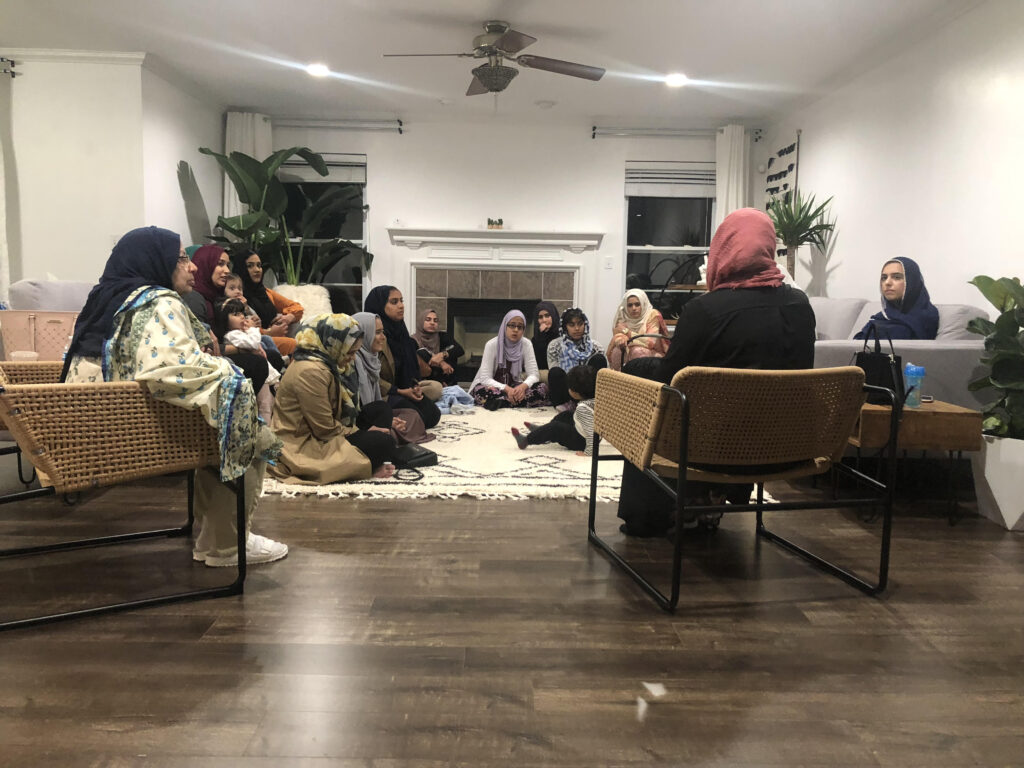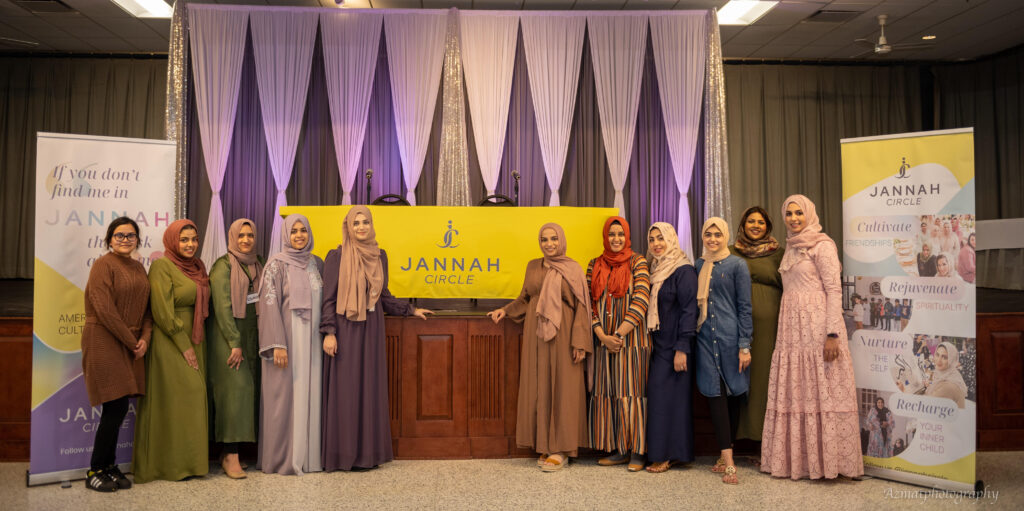Organic Evolvement of Nonprofits
By Tayyaba Syed
Sept/Oct 2023


The first time Amina Shams of Potomac, Md. stepped through the doors of Le Nid, an orphanage that resides on the top floor of a hospital in Meknes, Morocco, she could not help but notice how quiet it was. There were rows and rows of children laying in their cribs but most of them were not making a sound. She soon realized that these innocent babies lived with a harsh reality: why cry if no one is going to come?
Over the next few weeks, she got to spend time with her adopted son, providing as much love and sensory stimulation as she could and watched him bloom. “My heart ached for the children that I’d be leaving behind, and I knew I had to do more,” Shams said.
In 2017, with a group of other adoptive mothers, she founded BLOOM (Better Lives of Orphans Overcoming Misfortune) — the nation’s first 501(c)(3) nonprofit organization dedicated to providing mental health, development and educational support to children residing in Moroccan orphanages.
“We wanted to give back to the children we left behind as well as maintain a connection to our children’s birth country,” said Shams. “It happened organically as we talked to other families, and we were able to do things very quickly like put wheels on the cribs, add colors and sensory play items, and get local volunteers to interact with the kids for proper development. The purpose of the main caregivers on staff was to keep the orphans alive but not help them thrive. All these kids needed nurturing, so we decided to formalize our effort, fundraise and do things with structure. Our pilot project was to build an outdoor play garden upstairs for Le Nid. The photographer who was documenting the children’s first exposure to the play garden described their reaction like ‘birds being released from their cage.’ He then became our program volunteer. It’s these small impacts that keep us going.”
Even though BLOOM is a young volunteer-run nonprofit, the organization has been awarded the seal of transparency five years in a row, maintaining its grass-root community-based feel. Visit www.bloomcharity.org to learn more.
From Intention to Fruition
In 2018, Dr. Fariha Rub moved to Chicago and searched to find a community for herself. That same year, she lost a baby in utero (named Jannah) and performed Hajj. Upon returning, she founded a small halaqa group for Muslim women called Jannah Circle in Naperville, Ill.
“A lot of women relocate after marriage and don’t [easily] find community,” shares Rub, who is originally from St. Louis, Mo. “My initial intent was to get women together to talk about God once a month. We would meet at home to learn from a local female scholar/teacher and enjoy a meal together. We had social and spiritual time in one gathering.” Once the pandemic hit, Jannah Circle transitioned to virtual programs, collaborating with different speakers and organizations. They quickly grew to a community of 800+ women. Rub then recruited volunteers to help her bring in-person programming back on a larger scale post-Covid.
“We needed to borrow community spaces, banquet halls, and mosques to serve at a bigger capacity,” Rub recalls. “I wanted everyone to get a piece of the pie in a nonjudgmental setting and leave feeling closer to God.”
In December 2022, Jannah Circle transitioned into a 501(c)(3) nonprofit organization with an official team of board members and an executive leadership committee of volunteers, who are actively planning and executing its many programs and events. It offers a Sunday school for kids ages 4-11, a community outreach program, supports an orphanage in India as well as local refugee families and single women’s needs, spiritual and social events for women, children and families, and virtual classes.
To gain nonprofit status, it only took Jannah Circle a short amount of time due to it having a revenue of less than $50,000 a year. There was no paperwork or lawyer needed. Instead, they were able to apply online through a swift process.
“We hope to expand into a space that offers a sense of belonging for every member of the community from the cradle to the grave,” says Rub, who is a mother of three and a full time hospitalist by profession. “There needs to be a culture of acceptance and growth, and we want Jannah Circle to be able to provide that for people.”
For those looking to evolve into a nonprofit organization, Rub advises some things to consider like the amount of personal time, commitment and money that is needed to get started. However, she also advises that we should keep a check on our intentions at all times. If your intention remains pure, you can see great barakah (blessings), spiritual advancement, and a sense of community. It’s a beautiful feeling of leaving a legacy behind that comes with this work.
“Knowing that you are part of an effort towards increasing in sadaqa jariya (ongoing charity) even after you are gone makes it all worth it,” Rub said.
Check out www.jannahcircle.com to learn more.
Fruits of Labor
The process for Jannah Circle to eventually become a nonprofit from a small group was more gradual than it was for Carriers of Light (COL), a Quran-centered elementary school based in Wheaton, Ill. What originally began as a small part time memorization program for home-schooled girls in 2010, quickly became an established organization in a matter of months.
“We had one teacher and 12 students in my basement three times a week,” remembers Mehreen Bawla, who founded the school with fellow mom and friend Dr. Rand Diab. “In order to pay our teacher, we had to collect funds and needed nonprofit status from the start. We established a board right away and were incorporated by the end of the first year.”
According to Diab, the process to gain nonprofit status was difficult and required a lot of paperwork. ‘Thankfully,’ they had a nonprofit attorney who offered pro bono help. There are also multiple requirements such as having a board and by-laws. However, they did not need to have money in the bank to get started nor are federal audits required to maintain a 501(c)(3) status.
Since neither Bawla, a pharmacist, nor Diab, an ophthalmologist, were educators, they also had to figure out how to run a school efficiently and professionally. They put their trust in God and stayed determined to provide a sound environment for their girls to be able to memorize the Quran.
“We have just been the vehicles, but God is the One that has been guiding us and continuously opening doors for us,” Diab says. “Anytime we wanted to give up or hit a wall, He would show us a way. COL has so strongly been focused on Quranic education, and there’s lots of barakah (blessings) in that. Our mission has been to provide a positive atmosphere for kids to experience the Quran through love and joy and to connect with God in a beautiful way.”
This was lacking in the few programs Diab and Bawla had originally visited before opening COL. They found these places to be ‘cold’ and ‘uninviting’ and wanted to provide a better environment for their girls. The demand quickly grew, and COL added more days, more students, more grades and more subjects. The school relocated to an office space and then eventually moved into its own building in 2017. Since its inception, it has graduated 24 memorizers of the Quran. Now with 125 students, they have already outgrown their current space and are looking to expand yet again.
“As much as we would love to accommodate more students and families, we want to maintain COL’s elements of being Quran-centered, keeping a small student-teacher ratio and not diluting what makes us special and unique,” notes Diab.
Bawla adds that COL has always grown in a ‘careful’ way and is certain it will continue to do so with God’s help. To support, visit www.carriersoflight.com.
Tayyaba Syed is a multiple award-winning author, journalist, and Islamic studies teacher. She conducts literary and faith-based presentations for all ages and is an elected member of her local school district’s board of education in Illinois, where she lives with her husband and three children. Learn more at www.tayyabasyed.com.
Tell us what you thought by joining our Facebook community. You can also send comments and story pitches to horizons@isna.net. Islamic Horizons does not publish unsolicited material.
